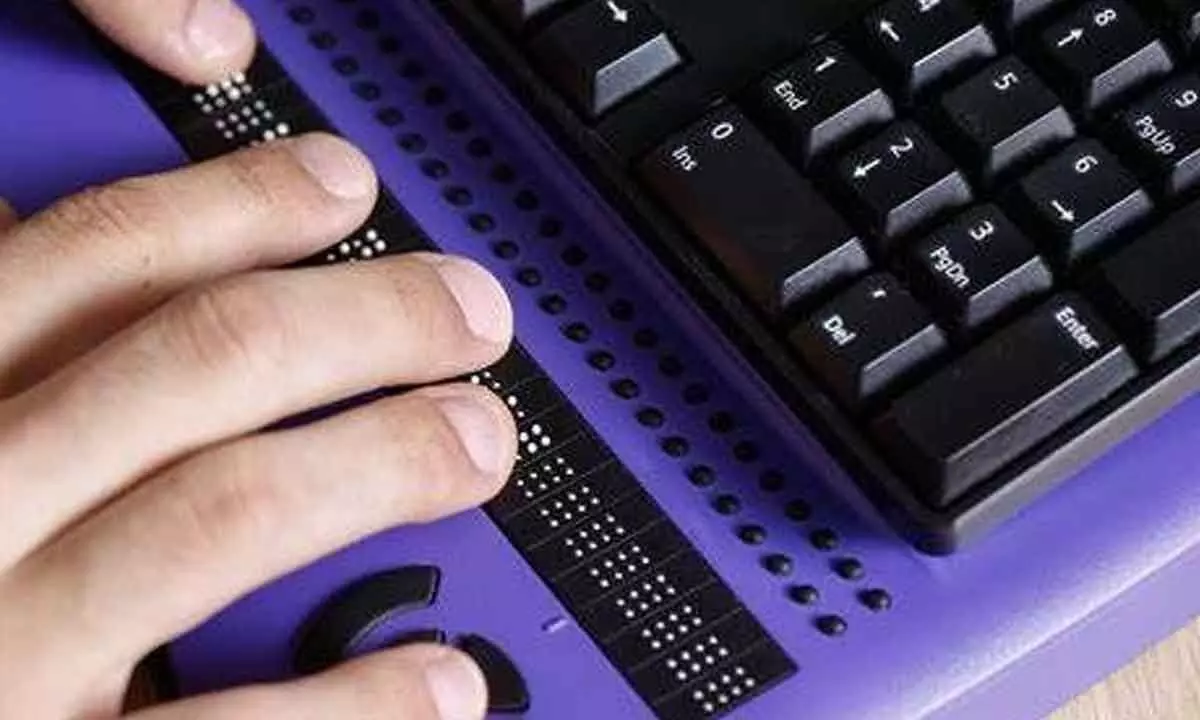IIT-K introduces touch sensitive Braille learning device for visually impaired

This innovative device serves as a powerful tool for beginners embarking on their journey to learn braille. Braille literacy rates have remained alarmingly low, with just about 1 per cent of the population in India and 5-10 pr cent in developed countries having access to this essential skill. The ‘Single Refreshable Braille Cell Based Braille Learning Device’ addresses this challenge by offering an affordable, self-learning solution that has the potential to transform the lives of countless visually impaired individuals.
Kanpur (UP): In a major breakthrough, the Indian Institute of Technology Kanpur has unveiled a pioneering assistive technology aimed at revolutionising braille literacy for visually impaired and blind individuals.
Developed by Prof. Siddhartha Panda and Vishwaraj Srivastava at the National Centre of Flexible Electronics (NCFlexE), IITK, the ‘Single Refreshable Braille Cell Based Braille Learning Device with a Touch Sensitive Array’ is set to make a significant impact in the field of accessible education.
According to an official release, this innovative device serves as a powerful tool for beginners embarking on their journey to learn braille.
Braille literacy rates have remained alarmingly low, with just about 1 per cent of the population in India and 5-10 pr cent in developed countries having access to this essential skill.
The ‘Single Refreshable Braille Cell Based Braille Learning Device’ addresses this challenge by offering an affordable, self-learning solution that has the potential to transform the lives of countless visually impaired individuals.
Prof. Abhay Karandikar, Director IIT Kanpur, said, “One of our primary goals at IIT Kanpur has always been to bridge gaps and create opportunities for those who face challenges in accessing education. This unique braille learning device represents a significant step towards achieving that goal. By providing an affordable and effective learning tool, this invention is set to empower visually impaired individuals with the skills they need to thrive in an increasingly digital world.”
“One of the primary cost drivers in modern digital braille learning devices is the inclusion of multiple braille cells, typically exceeding five, which substantially increases the overall price. Consequently, these devices often come with a prohibitive price tag, rendering them inaccessible to those who need them the most,” said Prof. Siddhartha Panda, one of the inventors. “Researchers worldwide have diligently worked towards reducing the cost of braille devices, including exploring single-cell braille solutions; however, such attempts have presented numerous challenges. We have tried to address those challenges in this device. Once patented and ready for commercial use, it would expectedly be a very affordable alternative,” he added.
A ‘Single Refreshable Braille Cell’ usually converts electronic text into Braille characters that can be read by touch. The existing devices in the market normally use multiple braille cells to get the required functionality.
But, in the pioneering technology developed at IIT Kanpur, a single braille cell has been seamlessly integrated with a cutting-edge touch array, enabling the device to deliver functionality comparable to multi-cell counterparts but at a significantly reduced cost. The device is specifically designed to instruct users in the fundamentals of braille, covering basic characters, words, and sentences.















